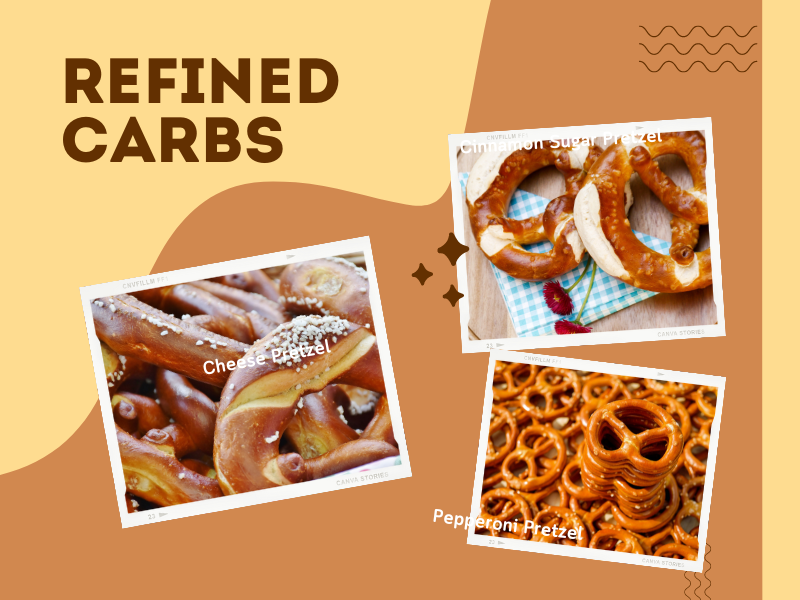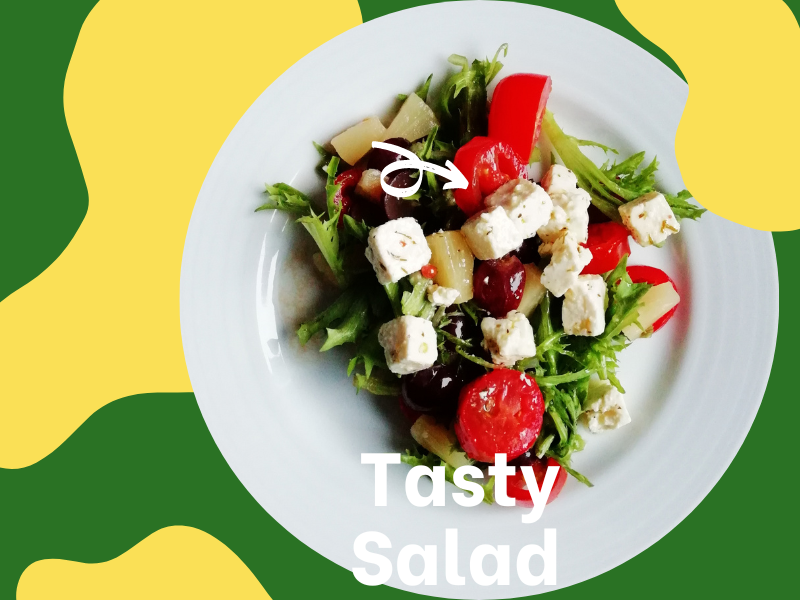
Below I will explore some of the benefits to be gained from reducing your total carbohydrate intake as part of a balanced diet.
Carbohydrates are great tasting foods that boost your mood and give that feeling of satisfaction after your meals. Carbohydrates consist starches and sugars from glucose in its most basic state to insoluble fibre in its most complex form.
Sources of carbohydrate
Some good sources of carbs are potatoes, bread, oats and other cereals, sweets and sugary drinks. Most people love the taste of carbs. But eating excessive amounts results in weight gain as it is broken down into sugar which the body converts to fat for storage in the liver and the subcutaneous fat cells just under your skin.
By cooking starchy foods we break down hard to digest plant cells to make food more palatable and easier to digest. But many starchy foods from grains contain anti-nutrients that also make it necessary to cook these foods before eating them.
Excess Carbs Are Stored as Fat
Some of it is also stored in the abdomen around the body’s internal organs. This is referred to as visceral fat. The kind that is linked to diabetes, hypertension and other chronic diseases. So there is great incentive to reduce carbohydrates in the diet. Especially refined carbohydrates such as cakes, sweet drinks and biscuits. So below are some of the reasons to limit simple carbohydrates in the diet.
1. Reduces the exposure of the teeth to sugar and dental caries.
According to the Mayo Clinic website dental caries result from a number of factors including the presence of bad bacteria in the mouth. These bacteria grow and multiply when we eat or drink sugary or high carb foods and drinks. Especially true when snacking between meals and not cleaning the teeth regularly after each meal and snack.
2. Reduces the Stress on the Pancreas to Secrete Insulin for Metabolism of Carbohydrates.
Although the process of digestion of carbohydrates start in the mouth, and continues in the stomach where gastric juices help to break it down further. The presence of starch and sugar in the stomach cause receptor cells to trigger secretion of insulin into the blood stream to ensure the sugar is taken up by the muscles cells and other body cells for energy supply. The Islet cells of the pancreas is responsible for the production and secretion of insulin and other digestive enzyme. So high carbohydrate intake does put a lot of stress on this vital organ and over time may result in decrease in insulin production and diabetes.
3. May support weight loss as part of a balanced diet.
The end result of carbohydrate ingestion is glucose in the blood. So having a large portion of say, white rice or white bread is going to result in a sharp rise in sugar in the blood. When this is excess of what is required the body start taking steps to reduce this sudden increase of blood sugar by storing some in the liver (excessive amount of fat deposits cause fatty liver disease, non-alcoholic) and surplus of what the liver can store is then converted to fatty acids and stored in fat cells around the body organs and subcutaneously. So reducing carbs can support weight loss.
4. Helps lower the risk of heart disease
Excessive fat within the abdominal cavity and around the vital organs is associated with hypertension, diabetes and cardiovascular diseases. By going low carb you will be taking steps to reduce the risk factors for these chronic diseases.
5. Reduce the risk of developing type two diabetes.
From the intrauterine environment the foetus may be exposed to high levels of sugar in the blood and start producing more insulin to keep the levels of sugar within normal limits. This is shown to result in a higher birth weight. If the little person is fed a high carbohydrate diet that is low in fibre and essential nutrients they will eventually develop metabolic syndrome, pre-diabetes and diabetes. This is just an example of how a high carb, low fibre diet is associated with the development of diabetes.
6. Helps with the management of type two diabetes if you are already affected.
The main fuel that the body uses for energy is carbohydrate that converts to glucose that the body cells can utilise. Other sources of energy are fat and protein. Diabetes is the condition of high blood sugar levels that result when the pancreas is making less than the required amount of insulin and/or the body is not able to use the insulin effectively to help cells take in and use the glucose. This causes a rise in glucose in the blood over time and the blood becomes sticky and unhealthy. This disease means the person is more prone to infections, poor healing of wounds, clots and obstruction of blood vessels throughout the body and vital organs. So without tight control the eyes, heart, kidneys, brain and limbs are all at risk of serious diseases.
7. Reduces triglyceride levels (high levels increase the risk of plaque formation in your blood vessels)
But what are triglycerides? Triglycerides are one form of energy source for our body. But too much is dangerous. The liver converts excess sugar into triglycerides which the body can store or utilise. This is a form of cholesterol that that may also be ingested from meat sources, but may also be produced by our bodies as a part of energy metabolism.
8. Is most effective for overall health, when low fibre highly processed foods are eliminated and high fibre whole foods are used in moderation.

It is great to eat carbohydrates as they make you feel good and satisfied when they are included in your diet. They actually cause your brain to produce endorphins (happy hormones) and this explains why it can be difficult to sustain a no card or ketogenic diet. But good quality carbs is important for digestion, cardiovascular health and blood sugar management. So this is a good reason that you will do well to scrub your vegetables rather than peel them. This way you get more fibre and more nutrients from your food.
9. This kind of health enhancing lifestyle or diet is sustainable in the long term.

As discussed above (in item 8) carbohydrate are very tasty and make us feel good. So having low carbs instead of virtually no carbs is more likely to be a sustainable diet or lifestyle choice.
10. A low carb diet mean that you can still enjoy the satisfying taste of carbohydrates while preventing the problems that come with excessive intake.
Diabetes comes with a lot of nasties. And type two diabetes may well be prevented (and is often controlled) by lower intake of simple carbs (the ones that lack fibre and nutrients, things like sugary drinks, cakes and doughnuts). Obesity, heart disease, high blood pressure and fatty liver disease are only a few of the problems related to excessive refined carbohydrate intake.
11. Helps reduce your risk of non-alcoholic fatty liver disease.
As stated before the liver stores excess carbohydrates as fat and excessive fatty deposits in the liver results in damage to the cells of this vital organ. This results in scarring and cirrhosis when the tissue heals. In the long term this may lead to liver cancer and/or liver failure.
12. Reduce the risk of gestational diabetes and the complications that result from this problem.
Diabetes that occurs and is diagnosed during pregnancy is referred to as gestational diabetes. This is a complication of pregnancy that requires extra antenatal visits with the midwife and obstetricians. They help the mother to keep her blood sugar levels within normal limits to reduce the risks to her and her baby. Some of the complications that can result from gestational diabetes include;
Large for gestational age baby – or macrosomnia
This can increase the risk of trauma at delivery, for both mother and baby. If the obstetric team are concerned about the size or accelerated growth of the baby they may offer an induction of labour, which has its own set of risks. The new born is also at high risk of hypoglycaemia and admission to the neonatal intensive care unit. So the prevention and management of this condition is vital, and restriction of carbohydrate intake is usually the key.
13. Helps with management of Polycystic Ovary Syndrome – PCOS ((an endocrine disorder in premenopausal women, associated with high levels of insulin and testosterone in the blood, obesity and insulin resistance).
In Nutrition and Metabolism Journal (2005) patients in a pilot study who reduced their total carbohydrate intake over a period of 24 weeks experienced weight loss of 12%, percent free testosterone reduction of 22%, LH/FSH ratio reduction of 36%, and fasting insulin reduction of 54%. Plus non-significant decreases in insulin, glucose, testosterone, HgbA1c, triglyceride, and perceived body hair.
14. Improves Fertility Outcome
And listen to this! two women became pregnant despite previous infertility problems. This study used a low carb /ketogenic diet. However there are other data showing similar improvement without totally eliminating carbs or achieving ketosis.
15. Gestational diabetes management includes restriction of simple carbs and total carbs.
Women suffering from gestational diabetes are provided with education and support to reduce the intake of simple carb and total carbs in order to reduce the risk of complications in the pregnancy.
In Summary:
Fourteen Benefits of A low carb diet include:
1. reduces dental caries,
2. reduces stress on the pancreas,
3. supports weight loss,
4. reduces the risk of heart disease,
5. reduce risk for type two diabetes,
6. helps manage type 2 diabetes,
7. reduces triglyceride levels,
8. improves fibre intake,
9. is sustainable,
10. is satisfying and helps your mood,
11. reduces the rick of fatty liver disease,
12. reduces the risk of gestational diabetes
13. helps manage PCOS,
14. improves fertility outcome,
15. helps manage gestational diabetes.
So there you have it, 15 great benefits of a low carb diet and lifestyle that is all based on facts. Carbs taste good and are the main source of fuel for our bodies. But for those of us who are seeking optimal health and want to prevent chronic diseases, a low carb diet deserves to be considered.

I use this type diet. Works well for me.
Thorough. Simply explained. Good examples. Nice layout.
Thanks for your comment Warren. Really appreciate you taking the time to read my post and give positive feedback.
Many thanks,
Brenda
Nice piece of information. At some point I struggled and had to use a dictionary. Perhaps the use of technical words should be followed with a simple-to-understand explanation. Lastly, the quoted authority can be linked in the text instead of linking the authorities at the end of the article.
Hi Samuel,
thanks for this really insightful and constructive feedback. Much appreciated. I will definitely edit this post and insert some explanation/definition for some of the medical jargon.
Really like that you took time to read and comment…thank you so much!
Cheers!
Brenda
The article is very well written! But I think your site can be beautified a little better!
Thank you!
Hi Milton, many thanks for visiting this site and for your kind feedback. I have since, added some much needed visuals. So I trust that it makes for a more enjoyable experience on my website. It was great that you took the time to leave a comment. Much appreciated.
Brenda